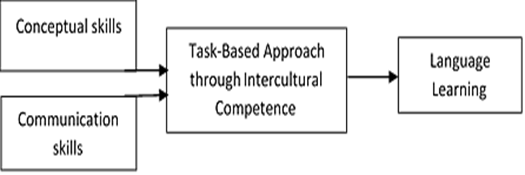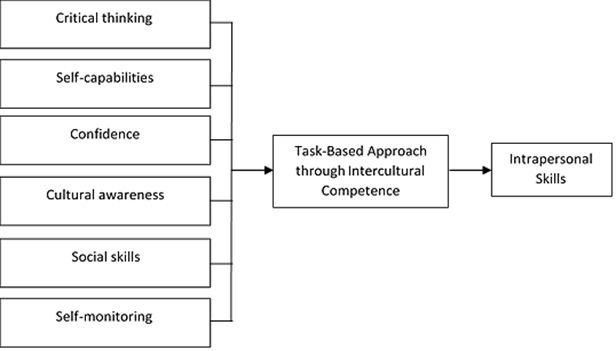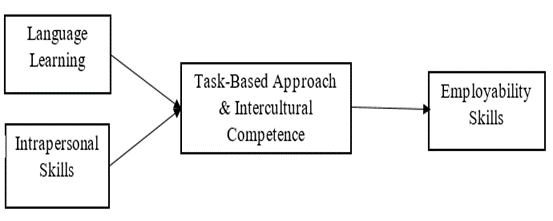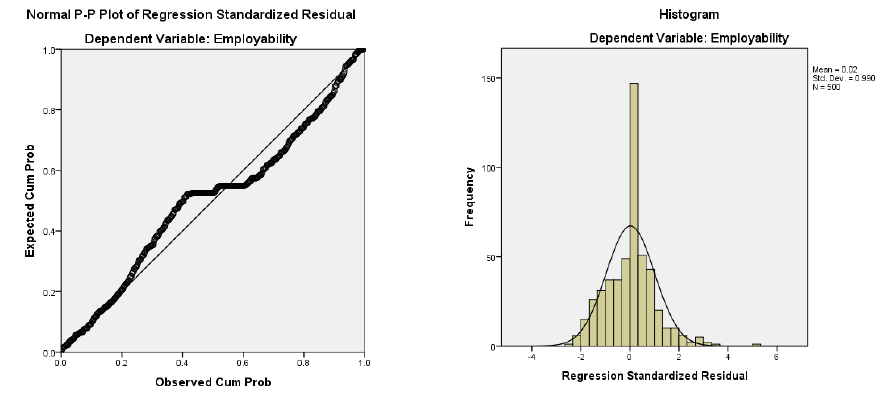Introduction
The need for 21st Century Skills seems to be clear in contexts of rapid development, such as East Asian countries (Rolleston, 2023), where labor markets are increasingly demanding a workforce with cognitive skills and interpersonal skills. The demand for graduates who can work in culturally varied situations has grown because of globalization and transnational work environments. Employers' top priorities now are finding suitably qualified applicants who not solely possess the fundamentals of academic success, such as writing, reading, speaking, and listening, but also possess higher-order cognitive abilities, such as comprehension, logical reasoning, creative problem-solving, and decision-making. Additionally, they are looking for employees who possess certain personal qualities, such as responsibility, self-control, integrity, social skills, honesty, self-confidence, adaptability and flexibility, team spirit, punctuality and efficiency, self-directedness, good work attitude, well-groomed, cooperative, self-motivated, and self-management. These competencies are also known as work readiness skills (Azmi et al., 2018).
Although it has been demonstrated that some of the skills necessary to function well in these situations are developed through international mobility experiences, and the overall marketable skills requirements of graduate employers have so often been depicted. According to research, learning a second language improves one's employability everywhere. The most promising and effective method among recent advancements in the teaching of second languages is certainly Task-Based Language instruction (Egele,Angela. Momoh, 2019) and Intercultural competence. There is a need to incorporate these effective methods into engineering education, which leads to the development of their soft skills. The Task-Based Language Teaching (TBLT) approach places greater emphasis on the significance of language and strategically designed specific tasks (Trihastutie & Fadilah, 2019). Many international engineering graduates will experience scenarios where they interact with foreign experts or work in a foreign country. Intercultural competencies and empathy for other cultures are significant factors that should be taken into consideration in engineering education (Sobkowiak, 2019). The present paper aims to find the significance of the task-based approach and intercultural competence among technical students in enhancing employability skills.
Literature Review
If universities are to become leaders and change agents, Seatter et al. (Seatter & Ceulemans, 2017) address the significance of abandoning conventional approaches to teaching and learning. To educate themselves and others, universities must engage with the concepts and paradigms of sustainable development. Employers are in search of individuals who grasp comprehensive concepts and possess the capability to acquire new knowledge. This assignment provided students with chances to expand their knowledge base. The students formulated their approach, shared ideas and information, expressed agreements and disagreements, and ultimately reached a collective decision. This process aided in nurturing their interpersonal abilities, effectively addressing conflicts, and adeptly handling interpersonal matters. (Anwer, 2019). Shiel et al. (Shiel et al., 2016) make a solid argument for the important part that universities play in community development, and they highlight that this participation places a high priority on sustainability results.
The Task-Based approach represents the expansive evolution of Communicative Language Teaching, as it places emphasis on meaningful communication through tasks (Brandl, 2019). Utilizing task-based language teaching proves to be a potent method for embedding exposure, usage, and motivation within classroom learning. Educators can wield it as a teaching tool to enhance students' English proficiency, furnishing them with the vital competence to excel in academic, professional, and personal spheres (Dorathy, 2018). The fundamental objective of English instruction revolves around effective communication. Task-based teaching significantly eliminates the gap between traditional grammar instruction and practical real-life usage, effectively connecting the elements of language form and significance while addressing other irregularities within English education. The procedure of Task-Based learning is enriched with self-examination, enlightenment, and self-consciousness, thereby amplifying students' inherent drive, sharpening their capacity to solve problems, cultivating cognitive approaches, promoting cooperative attitudes, and enthusiastic involvement. Additionally, this approach enables them to take pleasure in the gratification of completing tasks, fully unleashing their latent capabilities (Wang, 2018). Dipali and Swati (Kadam & Pusawale, 2023) carried out to evaluate how the Task-Based approach contributes to improving English language communication skills. Both qualitative and quantitative evaluations demonstrated that the Task-Based approach employed in English language classrooms stands as a superior method of active learning, surpassing the conventional mode of language instruction. This approach effectively enhances students' communicative proficiency.
In this approach of communicative language teaching, students are tasked with more than just memorizing grammar rules and constructing sentences. They are also expected to apply these rules in both written and spoken communication. As a result, a student cannot be considered truly skilled in a foreign language if they don't employ the language in a communicative manner (Khajavy et al., 2016). The teaching process should generate chances for students to experiment with various abilities and engage in interaction and negotiation through Task-Based activities. By motivating students to learn from their peers and real-world assignments, we enable them to independently analyze the factors contributing to their language proficiency or shortcomings. This empowers them to make choices about enhancing their language skills through practice (Ibrahim Mohammed Abdullah & Soliman Mahdi Soliman, 2019).
Similarly, for engineering students, cultural competence should be given importance along with language competence to develop the appropriate decisions in understanding cultural peculiarities during their professional lives. Building this competency is a challenging task, but once acquired, it helps save time in certain job roles. Building cultural awareness is possible through readings and discussions, while the opinions placed have to be measured and examined properly (Gopalkrishnan, 2019).
The study of Intercultural Communication examines the way people with various cultural and language origins behave, communicate, and perceive their environment (Aririguzoh, 2022). While teaching Intercultural Communication in institutions of higher learning, educators want their students to graduate with a certain degree of proficiency. These skills, attitudes, and knowledge all pertain to this competency. The study of Intercultural Communication, according to an intercultural perspective, "tends to focus on growing students' knowledge of cultural differences, their role within a globalized and diverse society, and how to connect effectively and meaningfully in these areas" (Allen, 2021). Intercultural education, which has also frequently been considered a sub-area of global education, can be seen as possessing intercultural earning and competency as significant dimensions (Maine & Vrikki, 2021).
Teachers and scholars are very concerned with the intercultural aspect of teaching foreign languages today. Students' ability to solve problems using information, skills, competencies, value relationships, and experience is impacted by their multicultural competence, which is an integrative quality of their personality. It enables effective student interaction in the multicultural environment of the technical university employing tools from the "Foreign Language Course" and comprises motivational, value, cognitive, and behavioral components. Since all communication takes place within a particular culture, cultural differences represent the main barrier to cross-cultural communication. Employers and company owners concur that language is the most essential element in effective cross-cultural communication. (Sahadevan & Sumangala, 2021). You learn about cultural differences and appropriate behaviors in various circumstances by interacting with people from various cultural backgrounds, in addition to understanding how cultures differ from one another. This is why a lot of internationalization initiatives in educational settings are geared towards offering learners intercultural learning opportunities, either at home in an international classroom or abroad during study excursions or work placements (Gregersen-Hermans, 2016).
A seamless fusion of technical skills and soft skills sets people apart from their peers, whether they are applying for jobs in industry or the government. Organizations used to place much emphasis on having people with in-depth subject knowledge needed to do their jobs. The rapid alteration of the workplace environment with people from different cultures and origins, however, has resulted in a major shift across a variety of industries as a result of the pervasive impact of the global economy.
Task-Based Approach to Attain Employability
Task-Based Language Teaching (TBLT) is a communicative strategy in language education that centers on accomplishing specific tasks. Its primary objective is to enhance students' ability to communicate by engaging them in authentic tasks (Enisa et al., 2017). Language learners often display passiveness when it comes to acquiring English proficiency. Nevertheless, the TBLT approach has revolutionized their English learning experience, potentially boosting their motivation and fostering positive learning attitudes (Beding & Inthapthim, 2019). While tasks have historically been integral to conventional language instruction methods, TBLT introduces a distinct rationale and criteria for task design and utilization. TBLT is set apart from other language teaching methods due to its emphasis on tasks as the main educational input. TBLT's implementation isn't solely based on its solid assumptions, principles, and second language acquisition theories but also on its well-founded reasoning. The adoption of TBLT is a result of an improved understanding of EFL learning's characteristics and processes, as well as the inadequacies of alternative approaches (Elsheikh Hago Elmahdi, 2016).
Intercultural competence to attain employability
Culture and language are considered to be strongly related. Building rapport and interacting with those who have different worldviews is the aim of developing Intercultural Communication skills (ICC), which go beyond simple interpersonal communication. The value of Intercultural competencies in a global marketplace appears to be universally accepted. Intercultural Competencies are recognized by hiring managers to a greater extent, and they are now a crucial component of job interviews for international organizations (Akdere et al., 2021). In addition to teaching the foreign language code, teachers are now expected to contextualize that code in light of the socio-cultural backdrop connected with the foreign language and to support students' development of Intercultural Communication skills (Deng et al., 2023).
Interacting with individuals from diverse cultural backgrounds is a frequent occurrence in various settings such as educational institutions, professional workplaces, healthcare, and politics. The study of intercultural communication is captivating, especially in the context of organizational communication. The concept of intercultural communication also encompasses the diverse array of communication challenges that emerge within an organization, involving interactions between people from distinct religious, ethnic, social, and educational backgrounds. Each of these individuals contributes a distinct collection of life experiences and principles to the professional environment, reflecting their culture (Ilie, 2019). The convergence of various factors, including globalization, growing migration, advancements in transportation networks, the progress of information technologies, global employment opportunities, educational exchange initiatives, intertwined economies, international travel, diplomatic partnerships, and concerns about global security, is uniting individuals from diverse cultural and religious backgrounds more frequently than ever before. According to Jalali et al. (Jalali et al., 2019), four key themes that help students in an intercultural environment are fostering open-mindedness, enhancing communication strategies, changing perceptions about the world, and acknowledging cultural differences. Skills such as vocabulary skills, critical thinking, conceptual skills, communication skills, and social skills are necessary skills that any employer looks forward to before hiring any candidate.
According to Byram's model of Intercultural Communicative Competence (Byram, 1997), the intercultural dimension in foreign languages places an emphasis on the acquisition of a critical threshold of competencies required for effective cross-cultural communication. And to assist the academic and personal development of all of the students, regardless of background, culture, language, religion, race, gender, sexual orientation, and other factors, teachers must possess Intercultural Competency (de Guzman et al., 2016). Both intercultural discourse and its value for social cohesion are generally understood and recognized by employers. Intercultural communicative competence is also essential for working in diverse teams. Hence, degrees in modern languages have a positive impact on employment, particularly when they incorporate ICC development.
Learning the Language through Task-Based Approach and Intercultural Competence
Combining a Task-Based Approach with an emphasis on Intercultural Competence during English language learning profoundly influences students. This approach doesn't just boost their language abilities but also nurtures comprehension of diverse cultures, flexibility, and proficiency in communication, ultimately readying them for achievement in a globalized and interconnected society.
The questions that were provided to the students were based on the two factors that determine the effectiveness of the Task-Based Approach through Intercultural Competence. The two determinants of the study are Language Learning and Interpersonal Skills. Fig 1 demonstrates the theoretical framework where different components help to develop language competence through the Task-Based Approach and Intercultural Competence.

Figure 1 Framework of Learning English Language through Intercultural Competence and Task-Based Approach
Enhancing Interpersonal Skills through Task-Based Approach and Intercultural Competence
Incorporating a task-based method through intercultural competence fosters a dynamic educational setting that empowers individuals with strong intrapersonal skills tailored to diverse multicultural environments. Through exposure to tasks that reflect cultural diversity and offering guidance for managing such interactions, individuals can build the essential skills needed to succeed in our interconnected and culturally diverse global community. Combining a Task-Based approach through Intercultural Competence can greatly improve individuals' interpersonal skills, fostering more effective and harmonious interactions in both personal and professional contexts.
Fig 2 demonstrates the theoretical framework where different components help to develop interpersonal skills through a Task-Based Approach and Intercultural Competence.
The Employability Status in India
According to data from the previous year, the employable talent in India increased from 46.2% to 50.3%, implying that more people were found to be employable. The India Skills Report 2023 by international online talent evaluation business Wheebox supports this (Quotes et al., 2023.). Between the expected skill level and the skill sets that the students possess, there is a significant skill gap. To represent the changing technical landscape of the sector, the engineering curriculum must stay up with current trends (Studio, 2022).
The data of NASSCOM (National Association of Software and Services Companies) appeared in the article of The Economic Times, “Only 25% IT Graduates Readily Employable” (Flash, 2023). There is a huge gap between industry and academia, and most professional graduates are not able to express their skills and thought processes effectively, along with their incompetence in working in a team. The transparency of skills developed through various courses structured in technical colleges is taken into consideration by the recruiters. It gives a company industrial benefits.
Objective
This study investigates how Intercultural Competence influences the development of employability skills among technical students using a task-based approach. It explores the intersection of cultural awareness and practical task-based learning to assess its impact on preparing students for professional success in diverse global environments. There are two objectives for the study, and they are:
To understand the significance of task-based language learning among technical students in developing employability skills.
To explore the adequacy of enhancing soft skills through Intercultural Competence among technical students.
Hypotheses
H0: There is no significant difference in Learning the English Language by Task-Based Approach through Intercultural Competence
H1: There is a significant difference in Learning the English Language by Task-Based Approach through Intercultural Competence
H0: There is no significant difference in enhancing Intrapersonal skills by Task-Based Approach through Intercultural Competence.
H2: There is a significant difference in enhancing Intrapersonal skills by a Task-Based Approach through Intercultural Competence.
1. Methods
1.1 Sample
This study employs a quantitative research design to examine the relationships between the Dependent Variable and its potential predictors, Independent Variables. A sample of 500 participants was selected from technical colleges of Madhya Pradesh. A questionnaire of 22 questions that were based on the different components of the Task-Based approach and Intercultural Competence was provided. Fig. 3.
1.2 Data collection instruments and procedures
The data for this study was collected through a questionnaire. The questionnaire was circulated through Google Forms. The participants were from the selected technical colleges located in Madhya Pradesh, India. The participants were from different parts of India. The data was collected using a convenient sampling method. The missing values were filtered in Microsoft Excel. The data is coded on a 5-point Likert scale ranging from 1 to 5 (1- strongly agree, 2- agree, 3- neutral, 4- Disagree, 5- strongly disagree). The data collection process ensured that the participants provided accurate and reliable responses to the survey questions.
Statistical analysis
The primary analysis technique employed in this study is multiple linear regression using the SPSS software 2023. A regression analysis was chosen as the analytical technique due to its ability to model the relationship between variables and provide insights into the strength and significance of those relationships.
1.3.1 Normality test
The histogram and P-P plot depicts that data is distributed normally across the population.
Table I shows the percentage distribution of 500 respondents for various factors that include dependent and independent variables.
The multiple regression analysis indicates that the model fits the data well, as the R-squared value is 0.918. This value suggests that approximately 91.8% of the variation in the dependent variable can be attributed to the independent variables used in the model. Moreover, the adjusted R-squared value, accounting for the model's complexity, is 0.916. The highly significant F-statistic of 0.000 (p < 0.05) further confirms the model's significance, emphasizing that the Task-Based Approach through Intercultural Competence enhances intrapersonal skills as well as language skills and exerts a substantial impact on the growth of employability skills (Table 2).
Table 3 Correlation between Task-Based Approach and Intercultural Competence to develop Intrapersonal skills

Table 3 shows the correlational values derived from the relationship between the dependent variable and the independent variables. The Pearson correlation for the dependent variable Employability with Critical Thinking, Self-Capabilities, Social Skills, Cultural Awareness, Self-monitoring, and Confidence is 0.918, 0.917, 0.935, 0.931, 0.928, and 0.912, respectively. It can be said that the Task-Based Approach through Intercultural Competence among technical students develops intrapersonal skills such as critical thinking, self-capabilities, Social Skills, Cultural awareness, Self-monitoring, and Confidence. Hence, developing intrapersonal skills gradually paves for developing employability skills.
Table 4 shows that the Standardized Coefficients (β) for the independent variables Critical thinking, Self-Capabilities, Social Skills, Cultural awareness, Self-monitoring, and Confidence are 0.130, 0.164, 0.232, 0.178, 0.200, and 0.084, respectively. Beta is a standard power metric that is often less than or equal to 0.8. The t-values of these independent variables are 3.034, 4.000, 4.747, 3.715, 4.473, and 2.093, respectively, at significant values of 0.003, 0.000, 0.000, 0.000, 0.000, and 0.037 respectively. So, it can be concluded that the Task-Based Approach through Intercultural Competence is statistically significant with Intrapersonal skills to enhance employability skills.
Table 5 The correlation between Task-Based Approach and Intercultural Competence to enhance Language learning skills

Table 5 shows the correlational values derived from the relationship between the dependent variable and the independent variables. The Pearson correlation for the dependent variable Employability with independent variables Learning Language through tasks, Vocabulary Skills through tasks, learning language with involvement, Conceptual learning, and Vocabulary Skills through Cross-cultural communication are 0.921, 0.909, 0.914, 0.910, and 0.901, respectively. It can be said that the task-based approach through intercultural competence has a positive impact on technical students' development of language skills such as communicative and conceptual skills.
Table 6 shows that the Standardized Coefficients (β) for the independent variables Learning Language through tasks, Vocabulary Skills through tasks, learning a language with involvement, Conceptual learning, and Vocabulary Skills through Cross-cultural communication are 0.261, 0.098, 0.226, 0.227, and 0.167, respectively. Beta is a standard power metric that is often less than or equal to 0.8. The t-values of these independent variables are 5.135, 2.006, 4.958, 5.282, and 4.015, respectively, at significant values of 0.000, 0.045, 0.000, 0.000, and 0.000, respectively. So, it can be concluded that the Task-Based Approach through Intercultural Competence is statistically significant with Language skills to enhance employability skills.
The sum of the squares between the variables is 1634.700 at degree of freedom 12. The F-static value is 454.393 at the significant value 0.000, which shows that the model is significant. Table 7.
2. Results
Developing soft skills along with technical skills increases the probability of qualifying for recruitment by major companies. The present study is carried out with two objectives: the first one is to find the significance of implementing a Task-Based Approach in technical colleges to enhance employability skills, and the second one is pertaining to the application of tasks through Intercultural Competence to develop soft skills. Both objectives have been sub-sectioned into two parts, such as growth in intrapersonal skills and language learning skills.
For the first objective, the correlation value lies between -0.9 and 0.9. So, there is no possibility of multicollinearity between the items. Similarly, there is no multicollinearity for the second objective, as the correlation value lies between -0.9 to 0.9. From the statistical analysis, it is evident that the significant value (p-value) is below 0.05 for all the variables. So, it can be said that by implementing a Task-Based Approach through Cross-Cultural competencies in classrooms, there is an overall positive impact among technical students. It develops Intrapersonal skills, Language skills, and Linguistic skills.
The study is limited to the questionnaire with an analysis of 500 technical students in Madhya Pradesh. Considering the limitation of the study, the benefits of implementing a Task-Based Approach through Intercultural Competence are evident. The challenge may include designing culturally relevant tasks, ensuring faculty members are adequately trained to facilitate intercultural learning, and assessing students' progress in both technical and soft skill domains.
3. Discussion
The implementation of a Task-Based Approach through Intercultural Competence has the capability to significantly amplify the employability of technical students (Chen & Wang, 2019). By equipping them with not only technical skills but also the ability to work effectively in varied teams, educational institutions can play a crucial role in preparing students for the demands of a rapidly changing job market. It is commonly recognized that having a solid foundation of discipline-specific knowledge is no longer sufficient to guarantee job opportunities upon graduating from a university (Asonitou, 2022). The study shows that the implementation of a task-based approach through intercultural competence has a positive impact and reduces the probability of unemployment.
Educational institutions can enhance their curricula by integrating Intercultural Competence and Task-Based learning strategies. This prepares students more effectively for the globalized workplace, where cross-cultural understanding and effective communication are important. The task-based approach offers students practical experiences resembling real-world challenges, thereby improving critical thinking, problem-solving, and teamwork abilities, which are considered interpersonal skills essential for employability in technical fields that emphasize collaboration and innovation. The basic qualities of empathy and building rapport with people from diverse cultural backgrounds are often lacking in those who overly prioritize competition, assessments, and academic excellence. Developing intercultural competencies as part of soft skills contributes to creating a more harmonious and peaceful world (Tandon, 2022).
While the study shows positive results, it recognizes limitations, such as the necessity for further research into long-term impacts on career development and the applicability of findings across diverse cultural settings.
Conclusion
As our world advances in interconnectedness, integrating Intercultural Competence into technical education is not just a suggestion but a necessity for fostering versatility and adaptability. The study serves as a driving force to inspire ongoing advancements in educational methodologies and policies, with the aim of equipping technical students for successful careers.
With reference to the objectives of the study, the findings show that students are most active through Task-Based method of teaching and learning. It is evident from the result that learning the English language and developing soft skills is possible through a Task-Based Approach and Intercultural Competence. As the workforce demands technical and non-technical skills from the candidates, the responsibility lies with the educational institution in major. These insights emphasize the necessity of including intercultural training in technical education programs to equip students for effective success in the global job market. Integrating these methods improves students' communication, collaboration, and problem-solving skills, while also deepening their understanding of cultural diversity and its relevance in professional environments. The study shows that by bridging the gap between technical skills and soft skills, a Task-Based Approach through Intercultural Competence equips students with the multidimensional skill set required to thrive in today's job markets.
Author contributions
Conceptualization, M.K. and V.B.; data curation, M.K. and V.B.; formal analysis, M.K. and V.B.; investigation, M.K.; methodology, M.K.; resources, M.K.; software, M.K.; supervision, V.B.; validation, M.K. and V.B.; visualization, M.K.; writing-original draft, M.K.; writing-review and editing, M.K. and V.B.























